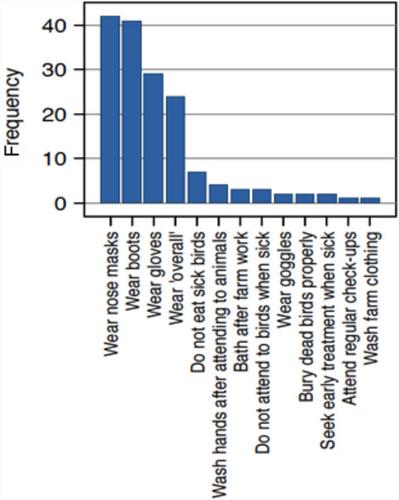当前位置:
X-MOL 学术
›
Vet. Med. Sci.
›
论文详情
Our official English website, www.x-mol.net, welcomes your
feedback! (Note: you will need to create a separate account there.)
Understanding attitude, practices and knowledge of zoonotic infectious disease risks among poultry farmers in Ghana.
Veterinary Medicine and Science ( IF 1.8 ) Pub Date : 2020-04-03 , DOI: 10.1002/vms3.257
Matilda Ayim-Akonor 1, 2 , Ralf Krumkamp 1 , Jürgen May 1 , Eva Mertens 1
Veterinary Medicine and Science ( IF 1.8 ) Pub Date : 2020-04-03 , DOI: 10.1002/vms3.257
Matilda Ayim-Akonor 1, 2 , Ralf Krumkamp 1 , Jürgen May 1 , Eva Mertens 1
Affiliation

|
Zoonotic infectious diseases (ZIDs) are increasing globally, and livestock farmers in low‐ and middle‐income countries are at particularly high risk. An evaluation of farmer's behaviour on farms can be used to identify the risk factors and to develop tailored control strategies. This study documents the knowledge of zoonotic poultry diseases (ZPD) among 152 poultry farm workers (respondents) from 76 farms in the Ashanti region of Ghana and assessed their on‐farm attitude and practices that increase their risk to exposure of ZPD. The median age of respondents was 29 years, 91.4% (n = 139) had a formal education, and 80.9% (n = 123) had worked on the farm for more than 1 year. The majority of farms (n = 69, 90.8%) had multiple flocks and 27.6% (n = 21) kept other animals, of which 57.1% (n = 12) were pigs. The majority of respondents had good knowledge about poultry diseases but not about ZPD. A higher level of education and longer work experience improved respondents’ knowledge of poultry and ZPD. Although respondents identified the wearing of personal protective equipment (PPE) as a major ZPD preventive measure, the majority did not put that knowledge into practice. Most farms (71.1%, n = 54) had no footbath and 55.3% (n = 42) deposited farm‐waste on the farm. While 97.4% (n = 148) of respondents washed their hands after working, only 48.7% (n = 74) wore protective footwear, 2.7% (n = 4) wore overalls, 2% (n = 3) wore nose masks and none (n = 0) wore gloves. The husbandry practices and attitude of farmers expose them to pathogens on the farm and increase their risk of becoming infected with ZPD in the sub‐region. The results from this study could be used to promote human health among farm workers in Ghana.
中文翻译:

了解加纳家禽农场主对人畜共患传染病风险的态度,做法和知识。
人畜共患传染病(ZIDs)在全球范围内正在增加,中低收入国家的牲畜养殖者处于特别高的风险中。对农民在农场上的行为的评估可用于识别风险因素并制定定制的控制策略。这项研究记录了来自加纳阿散蒂地区76个农场的152个家禽农场工人(受访者)的人畜共患禽病(ZPD)知识,并评估了他们的农场态度和做法,增加了他们接触ZPD的风险。受访者的中位年龄为29岁,有91.4%(n = 139)受过正规教育,有80.9%(n = 123)在农场工作了1年以上。大多数农场(n = 69,90.8%)有多个鸡群,而27.6%(n = 21)饲养了其他动物,其中57.1%(n = 12)是猪。大多数受访者对家禽疾病有很好的了解,但对ZPD则没有。较高的教育水平和较长的工作经验可以提高受访者对家禽和ZPD的了解。尽管受访者认为佩戴个人防护设备(PPE)是ZPD的一项主要预防措施,但大多数人并未将该知识付诸实践。大多数农场(71.1%,n = 54)没有洗脚盆,有55.3%(n = 42)没有在农场上存放粪便。97.4%(n = 148)的受访者下班后洗手,但只有48.7%(n = 74)穿着防护鞋,2.7%(n = 4)穿着工作服,2%(n = 3)戴口罩,没有(n = 0)戴手套。农民的饲养方式和态度使他们暴露于农场中的病原体,并增加了该分区感染ZPD的风险。这项研究的结果可用于促进加纳农场工人的人类健康。
更新日期:2020-04-03
中文翻译:

了解加纳家禽农场主对人畜共患传染病风险的态度,做法和知识。
人畜共患传染病(ZIDs)在全球范围内正在增加,中低收入国家的牲畜养殖者处于特别高的风险中。对农民在农场上的行为的评估可用于识别风险因素并制定定制的控制策略。这项研究记录了来自加纳阿散蒂地区76个农场的152个家禽农场工人(受访者)的人畜共患禽病(ZPD)知识,并评估了他们的农场态度和做法,增加了他们接触ZPD的风险。受访者的中位年龄为29岁,有91.4%(n = 139)受过正规教育,有80.9%(n = 123)在农场工作了1年以上。大多数农场(n = 69,90.8%)有多个鸡群,而27.6%(n = 21)饲养了其他动物,其中57.1%(n = 12)是猪。大多数受访者对家禽疾病有很好的了解,但对ZPD则没有。较高的教育水平和较长的工作经验可以提高受访者对家禽和ZPD的了解。尽管受访者认为佩戴个人防护设备(PPE)是ZPD的一项主要预防措施,但大多数人并未将该知识付诸实践。大多数农场(71.1%,n = 54)没有洗脚盆,有55.3%(n = 42)没有在农场上存放粪便。97.4%(n = 148)的受访者下班后洗手,但只有48.7%(n = 74)穿着防护鞋,2.7%(n = 4)穿着工作服,2%(n = 3)戴口罩,没有(n = 0)戴手套。农民的饲养方式和态度使他们暴露于农场中的病原体,并增加了该分区感染ZPD的风险。这项研究的结果可用于促进加纳农场工人的人类健康。

































 京公网安备 11010802027423号
京公网安备 11010802027423号